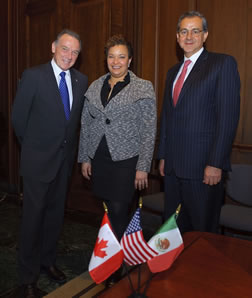Canada, Mexico and the United States Announce Grants to Address North American Environmental Challenges
Montreal, 16 February 2012—The Council of the Commission for Environmental Cooperation (CEC), composed of the ministers of environment of the three countries, today awarded more than $1.3 million in grants under the CEC’s North American Partnership for Environmental Community Action (NAPECA) program. The grants will support communities in their efforts to address environmental problems at the local level across North America.
Eighteen projects were chosen from 500 proposals received as part of a new initiative announced 22 June 2011, at the CEC Council’s meeting held in Montreal. The successful projects span the ecoregions of North America and support environmental action at the community level from the subarctic tundra, to the grasslands of the Great Plains, to the tropical forests of Mexico. Projects address issues ranging from the effects of climate change on Woodland Caribou and the Athabaskan Peoples in Canada, to citizen-powered air quality testing in Louisiana and protecting the health of women and children through the adoption of better, clean energy cooking stoves in Mexico.
CEC Council members—the environment ministers of the three North American Free Trade Agreement (NAFTA) countries (Canada’s Environment Minister Peter Kent, Mexico’s Secretary of the Environment and Natural Resources Juan Elvira Quesada and United States Environmental Protection Agency Administrator Lisa P. Jackson)—created the grant program to encourage innovative and model environmental initiatives at the community level in support of the CEC’s priorities.
Council members called for proposals that would promote healthy communities and ecosystems, encourage activities that address climate change through the transition to a low-carbon economy, and advance projects that could assist in greening the economies of the three countries.
The 18 projects were selected based on their significance for addressing community and North American environmental issues, their technical or scientific approaches, their emphasis on promoting partnerships, and their plan to produce clear and tangible results. The projects represent a broad base of hands-on groups and organizations, representing tribal nations, indigenous peoples, community organizations, environmental groups, and academic institutions.
To find out more about NAPECA, including details about the winning projects, visit www.cec.org/napeca.
Follow the progress of the projects on the following websites and social media channels:
Facebook – www.facebook.com/CECconnect
Twitter @CECweb

About the CEC
The Commission for Environmental Cooperation (CEC) was established in 1994 by the governments of Canada, Mexico and the United States through the North American Agreement on Environmental Cooperation, a parallel environmental agreement to NAFTA. As of 2020, the CEC is recognized and maintained by the Environmental Cooperation Agreement, in parallel with the new Free Trade Agreement of North America. The CEC brings together a wide range of stakeholders, including the general public, Indigenous people, youth, nongovernmental organizations, academia, and the business sector, to seek solutions to protect North America’s shared environment while supporting sustainable development for the benefit of present and future generations
The CEC is governed and funded equally by the Government of Canada through Environment and Climate Change Canada, the Government of the United States of Mexico through the Secretaría de Medio Ambiente y Recursos Naturales, and the Government of the United States of America through the Environmental Protection Agency.